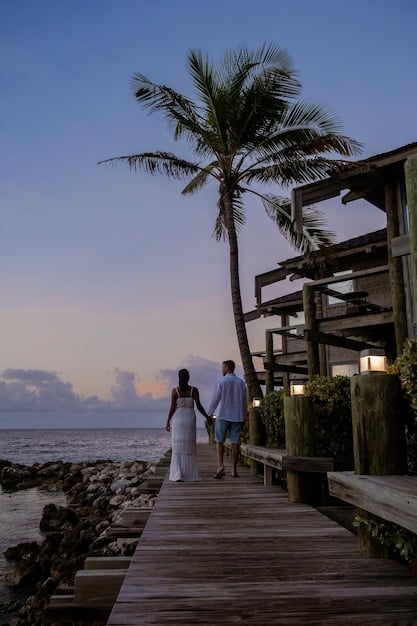Unlock 20% Off at Luxury Beach Resorts: Extended Stay Negotiation Guide

Securing a 20% discount on extended stays at luxury beach resorts is achievable through strategic direct negotiation, leveraging off-peak seasonality, offering flexible booking dates, and inquiring about loyalty programs or special direct booking incentives.
Dreaming of an opulent escape where the ocean whispers at your doorstep and every need is anticipated? For many, the allure of a luxury beach resort is undeniable, yet the cost can often seem prohibitive. However, what if there was a way to extend that dream vacation, perhaps even securing a substantial 20% discount on those extended stays? This guide delves into the astute strategies required to unlock such exclusive savings, turning aspirational travel into tangible reality.
Understanding the Luxury Resort Landscape for Negotiation
Before launching into negotiation tactics, it’s crucial to grasp the operational dynamics of luxury beach resorts. These properties, while seemingly idyllic, operate with intricate revenue management systems designed to maximize occupancy and average daily rates. Understanding their pain points and incentives can significantly empower your negotiation efforts.
Luxury resorts thrive on occupancy, especially during peak seasons. However, even the most sought-after destinations experience lulls. Off-peak periods, weekdays, and the shoulder seasons (the periods just before or after peak season) often present opportunities. During these times, resorts are more apt to offer incentives to fill rooms and maintain a steady revenue stream, even if it means a slight reduction in rate.
Seasonal Demand and Occupancy Rates
Luxury resorts meticulously track their occupancy. A few empty rooms can translate into lost revenue, especially for facilities like spas, restaurants, and excursions that rely on guest patronage. Therefore, during periods of lower projected occupancy, they become more flexible. This isn’t about desperation; it’s about smart business. Filling a room at a slightly lower rate is always preferable to leaving it empty.
- Shoulder Seasons: These are often the sweet spot for deals. The weather is still pleasant, but the crowds and prices are lower than peak season.
- Mid-Week Stays: Weekends are typically high-demand. Booking extended stays that include more weekdays can be a strong negotiation point.
- Last-Minute Opportunities: Sometimes, resorts have unexpected cancellations. If you have flexibility, inquiring about last-minute extended stays can yield results.
Beyond seasonal fluctuations, understanding the resort’s various revenue streams is key. They don’t just profit from room rates. Spa services, fine dining, private excursions, and boutique shopping all contribute significantly. Offering to engage with these additional services, even indirectly, can strengthen your negotiation position, signaling you’re a valuable guest beyond just your room rate.
Direct Negotiation: The Cornerstone of Discounting Extended Stays
The internet has revolutionized travel booking, but for significant discounts like 20% on extended luxury stays, bypassing online travel agencies (OTAs) and going directly to the source is paramount. OTAs like Expedia or Booking.com take a commission, which reduces the resort’s net revenue. By booking direct, you eliminate this middleman, freeing up potential margins for the resort to offer you a better deal.
Start by identifying the specific luxury beach resort that aligns with your desired experience. Once you have a few options in mind, initiate contact. Phone calls often prove more effective than emails for initial inquiries, as they allow for a more immediate and personal dialogue. It’s about building a rapport with the reservations manager or sales team.
Building Rapport and Presenting Your Proposal
Politeness and clarity are your best allies. When you call, introduce yourself and clearly state your intention: “I’m planning an extended stay of [number] nights at your beautiful resort, and I was wondering if there are any special rates or packages available for longer durations, particularly around [your preferred dates or flexible window].” Avoid immediately demanding a 20% discount. Instead, aim to uncover their usual long-stay offers first.
- Be Specific About Your Dates (or Flexibility): Knowing your exact dates helps them check availability. If you are flexible, mention it to open up more options.
- Highlight the “Extended Stay” Aspect: Emphasize the length of your stay. This is your primary leverage, as longer stays reduce their turnover costs.
- Inquire About Direct Booking Benefits: Many resorts offer perks like complimentary breakfast, spa credits, or upgraded rooms for direct bookings.
Once you’ve established a baseline, you can gently steer the conversation towards a discount. Mention that you are exploring several luxury properties for your extended vacation and are hoping to find the best value. Frame your request as a win-win: “Given the length of our stay, would there be any possibility of a preferred rate, perhaps around a 20% reduction, to secure our reservation with you directly?” Focus on presenting yourselves as desirable, low-fuss guests who will contribute positively to their occupancy. Be prepared for a counter-offer, or even an initial denial, and don’t be afraid to politely reiterate your interest and flexibility.
Leveraging Off-Peak and Shoulder Seasons for Maximum Impact
The timing of your extended stay is perhaps the most significant factor in securing a substantial discount. As previously mentioned, luxury resorts operate on dynamic pricing models. Peak seasons (e.g., major holidays, school breaks, ideal weather periods) see high demand and minimal flexibility in pricing. Conversely, off-peak and shoulder seasons offer a golden opportunity for negotiation.
Off-peak season refers to periods of lowest demand, often due to weather (e.g., hurricane season in the Caribbean, extreme heat in desert resorts) or simply a lack of major vacation periods. Shoulder seasons bridge the gap between peak and off-peak, offering a balance of decent weather with fewer crowds and generally more negotiable prices. Researching the climate and typical tourist flows for your desired destination is crucial.
Strategic Timing for Extended Stays
Booking during a resort’s low season can instantly open doors to discounts that are simply unavailable during high demand. While the weather might not be “perfect” every day, it’s often still very enjoyable, and the trade-off for a significantly reduced rate (and fewer crowds) can be well worth it. Consider these approaches:
- Research Your Destination’s Climate: Understand its peak and low seasons. For example, popular Caribbean islands have a “hurricane season” (roughly June to November) which is often excellent for deals, despite the slight risk.
- Look for “Sweet Spots”: Sometimes, even within a shoulder season, there are particular weeks or periods where demand temporarily dips.
- Be Flexible with Travel Dates: The more flexible you are, the more options the resort has to offer you a discounted rate during their lower occupancy periods.
Remember, the goal is to align your extended stay with the resort’s need to fill rooms. A 20% discount on an extended stay is a significant concession, and it often hinges on your willingness to travel when others might not. This flexibility demonstrates to the resort that you are a serious inquirer and willing to work with their operational needs, making them more inclined to offer a favorable deal.
The Power of Persistence and Polite Inquiry
Securing a 20% discount on an extended stay at a luxury beach resort isn’t always a one-call affair. Sometimes, it requires a degree of persistence and strategic follow-up. A single “no” doesn’t necessarily mean it’s impossible. It might just mean the person you spoke with isn’t authorized to offer that level of discount, or current occupancy projections don’t yet warrant it.
After your initial contact, allow a few days to pass if you didn’t receive the desired offer. During this time, you might research alternative properties or slightly different dates. When you follow up, reiterate your strong interest in *their* property. This shows loyalty and a genuine desire to stay with them, rather than simply shopping around. Polite persistence demonstrates that you are serious about your potential booking.
Following Up and Escalating Politely
When following up, reference your previous conversation and mention any specifics the representative noted. “I spoke with [Name, if you got it] a few days ago regarding an extended stay for [number] nights. I’m still very interested and wanted to check if there have been any updates on availability or special offers for that period.”
- Ask to Speak with a Manager: If the initial inquiry doesn’t yield results, politely ask to speak with a reservations manager or director of sales. Frame it as wanting to explore all available options for your extended stay.
- Mention Competitors (Subtly): You can casually mention that you are also considering other beautiful properties for your extended stay, but their resort remains your top choice. This can sometimes spur them to offer a better deal.
- Quantify Your Value: Remind them of the total potential revenue your extended stay represents, not just the nightly rate. A long stay is more valuable to them than multiple short bookings.
Be prepared to hear “no” again, but also be ready for a partial offer (e.g., 10-15% off) or additional perks instead of a flat discount. A resort might offer a complimentary upgrade, a resort credit, or free activities in lieu of a rate reduction. These added values can sometimes equate to or even exceed the monetary value of a 20% discount, especially if they align with what you would have spent anyway. Evaluate these offers against your overall budget and desired experience.

Beyond Price: Seeking Added Value and Bundled Perks
While a direct 20% discount on the room rate is the ultimate goal, it’s essential to recognize that luxury resorts often have more flexibility in offering added value. This can come in various forms, and sometimes these bundled perks can equate to or even exceed the monetary value of a flat percentage discount, especially for extended stays where ancillary services accumulate costs.
When negotiating, consider expressing interest in additional benefits if a direct room rate discount isn’t fully achievable. Think about what services you would typically use or expenses you would incur during an extended vacation. These might include meals, spa treatments, private excursions, airport transfers, or even room upgrades.
Negotiating for Inclusions and Credits
A resort might hesitate to drop their published room rate significantly, as it can devalue their brand perception. However, adding “freebies” or credits is often more palatable for them. It allows them to maintain their premium pricing while still providing tangible benefits to the guest.
- Food & Beverage Credits: Offering a daily or lump-sum credit for dining can save you hundreds of dollars over an extended stay.
- Spa or Wellness Credits: Many luxury resorts feature world-class spas. A credit here can be highly appealing.
- Complimentary Room Upgrades: Moving from a standard room to a suite or oceanfront view can dramatically enhance your experience without costing the resort much if those rooms are otherwise empty.
- Free Airport Transfers: Save on taxi or shuttle services to and from the resort.
- Complimentary Activities or Excursions: Access to non-motorized water sports, cooking classes, or guided tours.
When discussing these inclusions, frame them as part of your decision-making process for an extended stay. For example, “We are planning to dine at your incredible restaurants frequently during our two-week stay; would there be an opportunity to include a daily food and beverage credit as part of our package?” This approach highlights your intent to spend money on their property, making the additional perks a smart business move for them in the long run. Sometimes, a combination of a smaller percentage discount (e.g., 10-15%) coupled with valuable inclusions can collectively surpass the perceived benefit of a standalone 20% room rate reduction, making your extended stay even more luxurious and cost-effective.
Loyalty Programs and Existing Relationships
Your existing relationship with a particular hotel brand or resort chain can also serve as a powerful negotiation tool. If you are part of a loyalty program (e.g., Marriott Bonvoy, Hilton Honors, Hyatt Globalist), leverage your status. Higher tiers in these programs often come with benefits that can be combined with negotiated rates, or they might open doors to dedicated reservation lines that have more flexibility.
Even if you don’t have elite status, a history of staying at properties within the same brand can be mentioned. Resorts value repeat customers. They understand that a positive experience, potentially enhanced by a negotiated deal, could lead to future bookings and valuable word-of-mouth referrals.
Leveraging Your Guest History
When you contact the resort directly, make sure to provide your loyalty program number. Even if you’re not a top-tier member, this immediately identifies you as a known entity to the brand, rather than a completely new inquiry. This small detail can subtly influence their willingness to negotiate.
- Dedicated Loyalty Lines: Many top-tier loyalty programs have dedicated customer service lines where representatives might have more authority to offer bespoke deals.
- Past Stay Recaps: If you’ve had particularly good experiences at other properties within the same brand, mention them. “We loved our stay at your sister property in [location] last year, and we’re hoping to replicate that amazing experience for our extended stay here.”
- Inquire About “Friends and Family” or Corporate Rates: If you have any connections (e.g., through your employer, or knowing an employee), explore if any special rates might apply.
For truly exceptional extended stays, some luxury resorts might even consider creating a bespoke package for you. This could involve an unadvertised rate combined with specific services tailored to your preferences. The key is to convey your value as a long-term guest, emphasizing that a positive, discounted extended stay can forge a lasting relationship, leading to more business for the resort in the future.

The Art of the Pre-Payment and Non-Refundable Stay Offer
From the resort’s perspective, a guaranteed booking is highly desirable. Uncertainty in reservations, particularly for extended stays, can lead to revenue management headaches. This is where offering a pre-payment or committing to a non-refundable extended stay can become a powerful negotiation chip in your quest for a 20% discount.
Most luxury resorts offer a small discount for non-refundable bookings. For an extended stay, this discount can be amplified. By paying upfront or agreeing to strict cancellation terms, you significantly reduce the financial risk for the resort, making them more inclined to offer a more favorable rate.
Offering Security to the Resort
When you’re confident in your travel plans and have secured a provisional offer, consider asking: “If we were to pre-pay the full amount for our extended stay, or commit to a fully non-refundable booking, would that enable you to offer a further reduction, perhaps closer to the 20% we discussed?”
- Reduced Risk for Resort: Pre-payment guarantees revenue, eliminating concerns about last-minute cancellations.
- Cash Flow Improvement: For the resort, cash upfront is always better for their operational planning.
- Serious Intent: It signals to the resort that you are a highly committed guest, not just casually inquiring.
It’s crucial to exercise caution with non-refundable bookings. Ensure your travel insurance is comprehensive enough to cover unforeseen circumstances that might force you to cancel. However, for those with solid travel plans, this strategy can provide the leverage needed to push a good deal into a truly exceptional one, bringing that 20% discount within reach for your dream luxury beach escape. The combination of direct negotiation, strategic timing, leveraging loyalty, and offering financial security crafts a compelling case for the resort to extend significant savings.
| Key Point | Brief Description |
|---|---|
| 📞 Direct Contact | Bypassing OTAs allows resorts to offer better rates by cutting commission costs. |
| 🗓️ Strategic Timing | Negotiate during off-peak or shoulder seasons when resorts seek to boost occupancy. |
| ✨ Seek Added Value | Beyond discounts, aim for free upgrades, F&B credits, or complimentary services. |
| 🔒 Pre-Payment Power | Offering non-refundable, upfront payment can significantly increase negotiation leverage. |
Frequently Asked Questions
▼
While not guaranteed, a 20% discount for extended stays at luxury beach resorts is certainly achievable through strategic and persistent direct negotiation, especially during off-peak seasons or by leveraging specific booking advantages. It requires a proactive approach and understanding resort operational needs.
▼
The best times are typically during shoulder seasons (just before or after peak) or the true off-peak season. Resorts have lower occupancy during these periods and are more inclined to offer discounts to fill rooms. Weekday inclusions in your extended stay also increase your leverage.
▼
For extended stay discounts, always negotiate directly with the resort. OTAs take a commission (often 15-25%), which reduces the resort’s profit margin. By booking direct, you’re giving the resort more revenue potential, which they can then partially pass on to you as a discount.
▼
If a direct percentage discount is challenging, consider asking for complimentary upgrades (room/suite), food and beverage credits, spa credits, free airport transfers, or discounted resort activities. These perks can significantly enhance your experience and provide substantial savings equivalent to a discount.
▼
Yes, absolutely. If you have elite status with a hotel brand, mention it during your negotiation. Loyalty members are highly valued, and resorts often offer additional flexibility or exclusive deals to retain top-tier guests. Even non-elite status loyalty can signal a repeat customer.
Conclusion
Securing a 20% discount on extended stays at a luxury beach resort is not a mere pipe dream; it’s a strategically attainable goal for the informed traveler. By understanding the ebb and flow of resort occupancy, engaging in direct and persistent negotiation, embracing flexibility in your travel dates, and intelligently leveraging the value of an extended pre-paid commitment, you position yourself as an ideal guest. The pursuit of luxury need not always come at the highest price, and with these insights, your next opulent escape can be both indulgent and surprisingly economical.





